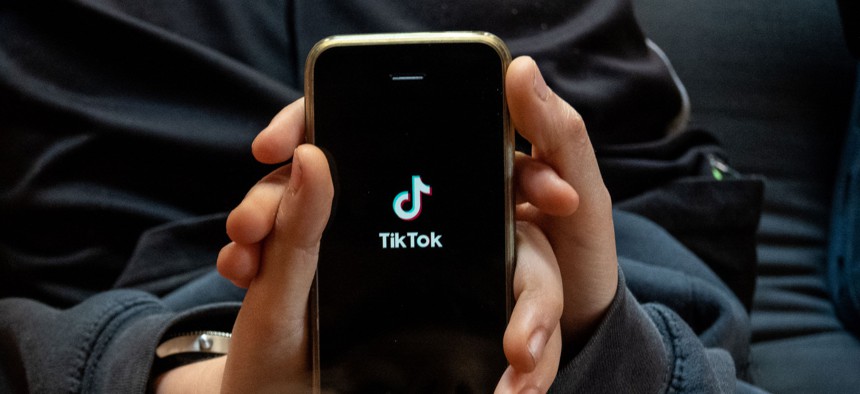Enforcement Questions Dog State’s Proposed TikTok Ban

Photo by Matt Cardy/Getty Images
One expert derided legislation like Montana’s statewide ban on TikTok as unenforceable from a technological point of view. What's more, states acting individually to ban foreign-made technology can be problematic, researchers say.
Montana’s proposed statewide ban on TikTok and other social media apps still is unenforceable and technologically unsound, critics said, even after Gov. Greg Gianforte amended the legislation to widen its scope.
Originally, the ban prohibited mobile app stores from offering the TikTok app for users to download inside state lines and banned its use by state residents starting Jan. 1, 2024.
Gianforte amended the original bill to ban “social media applications that send data to foreign adversaries on all electronic devices,” per the revised text. The revisions also remove liability from the mobile app store operators, which would have been fined $10,000 a day for violating the law, including each time a user accesses the app. Individual app users would still not be subject to any fines.
But the bill still leaves unanswered questions about how the ban will be enforced. The bill text offers no specifics on enforcement, except to put the Montana Department of Justice in charge of it.
“This bill is breathtakingly obtuse in its approach,” said Andy Green, an assistant professor of information security and assurance at Kennesaw State University. “The legislators in Montana don't understand, and it's not surprising that legislators don't understand the intricacies of the internet.”
TikTok also criticized the bill’s lack of an enforcement mechanism in a statement when the bill passed last month. The company accused the legislation’s proponents of having “no feasible plan for operationalizing” it.
Spokespersons for the Montana Department of Justice and state Sen. Shelley Vance, who sponsored the original bill, did not respond to requests for comment on how they plan to enforce the proposed ban. Attorney General Austin Knudsen has said in previous public statements that the bill is necessary because the Chinese government uses TikTok to “spy on Americans by tracking locations and keeping other personal information.”
The best way to enforce a statewide TikTok ban would be to track users’ IP addresses. But John Perrino, a policy analyst at the Stanford Internet Observatory, said such tactics are typically not used at the state level but instead are applied by investigators trying to track criminal activity nationally. IP addresses also are an imperfect measure of someone’s location.
Perrino said it is no surprise to see bills like this one as children’s online safety issues have risen on lawmakers’ agendas. But, he said, there is “no clear way to take action” given the technological complexities.
“Implementation would be far more difficult than [elected officials] realize, because when you're doing any online safety legislation on the basis of age or location, that requires some way to collect information that verifies age or location,” he said.
Another—albeit less likely—method to enforce the ban could be mandating that Apple and Google build more location-tracking features into the apps found in their app stores. Those features could rely on GPS tracking or even triangulation from cell towers, but Green said it would be a big lift, even if Apple and Google were willing to bend to Montana’s will and not fight the requirements in court.
Changing the fundamental features of apps would be “very much like trying to reposition an oil tanker; it doesn't stop on a dime,” Green said. “It takes time, and that's assuming that they built their infrastructure in such a way that it can be modified in this aspect.”
The easiest workaround for users trying to skirt state-level bans would be to use a virtual private network, which replace a user’s IP address with the address of the VPN server, allowing users to mask their physical locations. Another scenario, which Perrino described as a “crazy idea,” is Montana residents driving into neighboring states to update or download the TikTok app.
That hypothetical situation, which Perrino described as “some kind of weird geotourism,” has echoes of the early days of Pokemon Go, where players would travel to specific destinations to catch certain characters in the augmented reality game. This type of geotourism might catch on, Perrino added, if more states prevent residents from accessing pornography.
The bans enacted by the federal government and many states outlawing the use of TikTok on government devices are easier to enforce. Half of states now prohibit the app’s use on internet-enabled devices they provide workers, and the ban is achievable due to centralized mobile device management.
“With official government devices, the IT department knows the device ID, and the IT department controls the network that you are connecting to,” Perrino said. “At a government level, it's far more difficult when you are trying to implement a ban or restrict access to the general public, particularly at a state level.”
Additionally, states acting individually to ban foreign-made technology can be problematic, researchers have warned. Jack Corrigan, a research analyst at Georgetown University’s Center for Security and Emerging Technology said earlier this year that there should be more transparency from the federal government on national security threats from tech, and that they should lead the way on bans.
While the national security concerns surrounding TikTok are valid, Green said the app itself is “no different from any other social media app” in the way it collects data on its users and how they interact with the app, and then monetizes that data to sell advertising.
“[Users are] the product being sold,” he said. “If you're not paying for the service, you're the product being sold. There is no such thing as a free lunch.”






